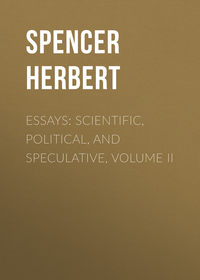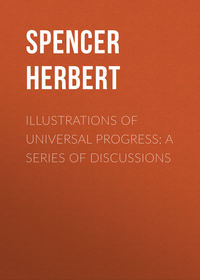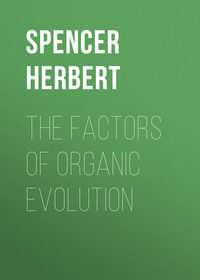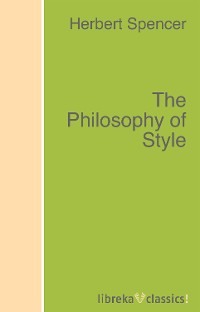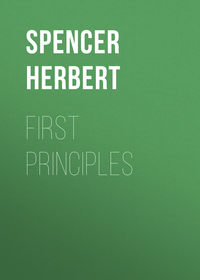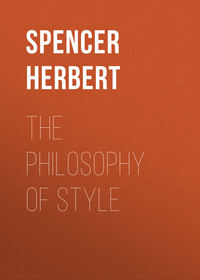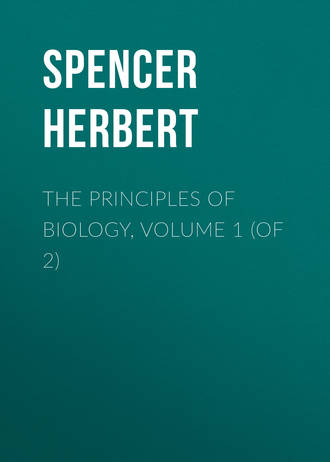 полная версия
полная версияThe Principles of Biology, Volume 1 (of 2)
Doubtless some of those who remember Weber's results, have had on the tip of the tongue the argument derived from the tip of the tongue. This part exceeds all other parts in power of tactual discrimination: doubling, in that respect, the power of the forefinger-tip. It can distinguish points that are only one-twenty-fourth of an inch apart. Why this unparalleled perceptiveness? If survival of the fittest be the ascribed cause, then it has to be shown what the advantages achieved have been; and, further, that those advantages have been sufficiently great to have had effects on the maintenance of life.
Besides tasting, there are two functions conducive to life, which the tongue performs. It enables us to move about food during mastication, and it enables us to make many of the articulations constituting speech. But how does the extreme discriminativeness of the tongue-tip aid these functions? The food is moved about, not by the tongue-tip, but by the body of the tongue; and even were the tip largely employed in this process, it would still have to be shown that its ability to distinguish between points one-twenty-fourth of an inch apart, is of service to that end, which cannot be shown. It may, indeed, be said that the tactual perceptiveness of the tongue-tip serves for detection of foreign bodies in the food, as plum-stones or as fish-bones. But such extreme perceptiveness is needless for the purpose. A perceptiveness equal to that of the finger-ends would suffice. And further, even were such extreme perceptiveness useful, it could not have caused survival of individuals who possessed it in slightly higher degrees than others. It needs but to observe a dog crunching small bones, and swallowing with impunity the sharp-angled pieces, to see that but a very small amount of mortality would be prevented.
But what about speech? Well, neither here can there be shown any advantage derived from this extreme perceptiveness. For making the s and z, the tongue has to be partially applied to a portion of the palate next the teeth. Not only, however, must the contact be incomplete, but its place is indefinite – may be half an inch further back. To make the sh and zh, the contact has to be made, not with the tip, but with the upper surface of the tongue; and must be an incomplete contact. Though, for making the liquids, the tip of the tongue and the sides of the tongue are used, yet the requisite is not any exact adjustment of the tip, but an imperfect contact with the palate. For the th, the tip is used along with the edges of the tongue; but no perfect adjustment is required, either to the edges of the teeth, or to the junction of the teeth with the palate, where the sound may equally well be made. Though for the t and d complete contact of the tip and edges of the tongue with the palate is required, yet the place of contact is not definite, and the tip takes no more important share in the action than the sides. Any one who observes the movements of his tongue in speaking, will find that there occur no cases in which the adjustments must have an exactness corresponding to the extreme power of discrimination which the tip possesses: for speech, this endowment is useless. Even were it useful, it could not be shown that it has been developed by survival of the fittest; for though perfect articulation is an aid, yet imperfect articulation has rarely such an effect as to impede a man in the maintenance of his life. If he is a good workman, a German's interchanges of b's and p's do not disadvantage him. A Frenchman who, in place of the sound of th, always makes the sound of z, succeeds as a teacher of music or dancing, no less than if he achieved the English pronunciation. Nay, even such an imperfection of speech as that which arises from cleft palate, does not prevent a man from getting on if he is capable. True, it may go against him as a candidate for Parliament, or as an "orator" of the unemployed (mostly not worth employing). But in the struggle for life he is not hindered by the effect to the extent of being less able than others to maintain himself and his offspring. Clearly, then, even if this unparalleled perceptiveness of the tongue-tip is required for perfect speech, such use is not sufficiently important to have been developed by natural selection.
How, then, is this remarkable trait of the tongue-tip to be accounted for? Without difficulty, if there is inheritance of acquired characters. For the tongue-tip has, above all other parts of the body, unceasing experiences of small irregularities of surface. It is in contact with the teeth, and either consciously or unconsciously is continually exploring them. There is hardly a moment in which impressions of adjacent but different positions are not being yielded to it by either the surfaces of the teeth or their edges; and it is continually being moved about from some of them to others. No advantage is gained. It is simply that the tongue's position renders perpetual exploration almost inevitable; and by perpetual exploration is developed this unique power of discrimination. Thus the law holds throughout, from this highest degree of perceptiveness of the tongue-tip to its lowest degree on the back of the trunk; and no other explanation of the facts seems possible.
"Yes, there is another explanation," I hear some one say: "they may be explained by panmixia." Well, in the first place, as the explanation by panmixia implies that these gradations of perceptiveness have been arrived at by the dwindling of nervous structures, there lies at the basis of the explanation an unproved and improbable assumption; and, in the second place, even were there no such difficulty, it may with certainty be denied that panmixia can furnish an explanation. Let us look at its pretensions.
* * * * *It was not without good reason that Bentham protested against metaphors. Figures of speech in general, valuable as they are in poetry and rhetoric, cannot be used without danger in science and philosophy. The title of Mr. Darwin's great work furnishes us with an instance of the misleading effects produced by them. It runs: —The Origin of Species by means of Natural Selection, or the Preservation of favoured Races in the Struggle for Life. Here are two figures of speech which conspire to produce an impression more or less erroneous. The expression "natural selection" was chosen as serving to indicate some parallelism with artificial selection – the selection exercised by breeders. Now selection connotes volition, and thus gives to the thoughts of readers a wrong bias. Some increase of this bias is produced by the words in the second title, "favoured races;" for anything which is favoured implies the existence of some agent conferring a favour. I do not mean that Mr. Darwin himself failed to recognize the misleading connotations of his words, or that he did not avoid being misled by them. In chapter iv of the Origin of Species, he says that, considered literally, "natural selection is a false term," and that the personification of Nature is objectionable; but he thinks that readers, and those who adopt his views, will soon learn to guard themselves against the wrong implications. Here I venture to think that he was mistaken. For thinking this, there is the reason that even his disciple, Mr. Wallace – no, not his disciple, but his co-discoverer, ever to be honoured – has apparently been influenced by them. When, for example, in combating a view of mine, he says that "the very thing said to be impossible by variation and natural selection has been again and again effected, by variation and artificial selection," he seems clearly to imply that the processes are analogous, and operate in the same way. Now this is untrue. They are analogous only within certain narrow limits; and, in the great majority of cases, natural selection is utterly incapable of doing that which artificial selection does.
To see this it needs only to de-personalise Nature, and to remember that, as Mr. Darwin says, Nature is "only the aggregate action and product of many natural laws [forces]." Observe its relative shortcomings. Artificial selection can pick out a particular trait, and, regardless of other traits of the individuals displaying it, can increase it by selective breeding in successive generations. For, to the breeder or fancier, it matters little whether such individuals are otherwise well constituted. They may be in this or that way so unfit for carrying on the struggle for life, that were they without human care, they would disappear forthwith. On the other hand, if we regard Nature as that which it is, an assemblage of various forces, inorganic and organic, some favourable to the maintenance of life and many at variance with its maintenance – forces which operate blindly – we see that there is no such selection of this or that trait; but that there is a selection only of individuals which are, by the aggregate of their traits, best fitted for living. And here I may note an advantage possessed by the expression "survival of the fittest;" since this does not tend to raise the thought of any one character which, more than others, is to be maintained or increased; but tends rather to raise the thought of a general adaptation for all purposes. It implies the process which Nature can alone carry on – the leaving alive of those which are best able to utilize surrounding aids to life, and best able to combat or avoid surrounding dangers. And while this phrase covers the great mass of cases in which there are preserved well-constituted individuals, it also covers those special cases which are suggested by the phrase "natural selection," in which individuals succeed beyond others in the struggle for life, by the help of particular characters which conduce in important ways to prosperity and multiplication. For now observe the fact which here chiefly concerns us, that survival of the fittest can increase any serviceable trait, only if that trait conduces to prosperity of the individual, or of posterity, or of both, in an important degree. There can be no increase of any structure by natural selection unless, amid all the slightly varying structures constituting the organism, increase of this particular one is so advantageous as to cause greater multiplication of the family in which it arises than of other families. Variations which, though advantageous, fail to do this, must disappear again. Let us take a case.
Keenness of scent in a deer, by giving early notice of approaching enemies, subserves life so greatly that, other things equal, an individual having it in an unusual degree is more likely than others to survive; and, among descendants, to leave some similarly endowed or more endowed, who again transmit the variation with, in some cases, increase. Clearly this highly useful power may be developed by natural selection. So also, for like reasons, may quickness of vision and delicacy of hearing; though it may be remarked in passing that since this extra sense-endowment, serving to give early alarm, profits the herd as a whole, which takes the alarm from one individual, selection of it is not so easy, unless it occurs in a conquering stag. But now suppose that one member of the herd – perhaps because of more efficient teeth, perhaps by greater muscularity of stomach, perhaps by secretion of more appropriate gastric juices – is enabled to eat and digest a not uncommon plant which the others refuse. This peculiarity may, if food is scarce, conduce to better self-maintenance, and better fostering of young if the individual is a hind. But unless this plant is abundant, and the advantage consequently great, the advantages which other members of the herd gain from other slight variations may be equivalent. This one has unusual agility, and leaps a chasm which others balk at. That one develops longer hair in winter, and resists the cold better. Another has a skin less irritated by flies, and can graze without so much interruption. Here is one which has an unusual power of detecting food under the snow; and there is one which shows extra sagacity in the choice of a shelter from wind and rain. That the variation giving ability to eat a plant before unutilized, may become a trait of the herd, and eventually of a variety, it is needful that the individual in which it occurs shall have more descendants, or better descendants, or both, than have the various other individuals severally having their small superiorities. If these other individuals severally profit by their small superiorities, and transmit them to equally large numbers of offspring, no increase of the variation in question can take place: it must soon be cancelled. Whether in the Origin of Species Mr. Darwin has recognized this fact, I do not remember, but he has certainly done it by implication in his Animals and Plants under Domestication. Speaking of variations in domestic animals, he there says that "any particular variation would generally be lost by crossing, reversion, and the accidental destruction of the varying individuals, unless carefully preserved by man." (Vol. II, p. 292.) That which survival of the fittest does in cases like the one I have instanced, is to keep all faculties up to the mark, by destroying such individuals as have faculties in some respect below the mark; and it can produce development of some one faculty only if that faculty is predominantly important. It seems to me that many naturalists have practically lost sight of this, and assume that natural selection will increase any advantageous trait. Certainly a view now held by some assumes as much.
The consideration of this view, to which the foregoing paragraph is introductory, may now be entered upon. This view concerns, not direct selection, but what has been called, in questionable logic, "reversed selection" – the selection which effects, not increase of an organ, but decrease of it. For as, under some conditions, it is of advantage to an individual and its descendants to have some structure of larger size, it may be, under other conditions – namely, when the organ becomes useless – of advantage to have it of smaller size; since, even if it is not in the way, its weight and the cost of its nutrition are injurious taxes on the organism. But now comes the truth to be emphasized. Just as direct selection can increase an organ only in certain cases, so can reversed selection decrease it only in certain cases. Like the increase produced by a variation, the decrease produced by one must be such as will sensibly conduce to preservation and multiplication. It is, for instance, conceivable that were the long and massive tail of the kangaroo to become useless (say by the forcing of the species into a mountainous and rocky habitat filled with brushwood), a variation which considerably reduced the tail might sensibly profit the individual in which it occurred; and, in seasons when food was scarce, might cause survival when individuals with large tails died. But the economy of nutrition must be considerable before any such result could occur. Suppose that in this new habitat the kangaroo had no enemies; and suppose that, consequently, quickness of hearing not being called for, large ears gave no greater advantage than small ones. Would an individual with smaller ears than usual, survive and propagate better than other individuals, in consequence of the economy of nutrition achieved? To suppose this is to suppose that the saving of a grain or two of protein per day would determine the kangaroo's fate.
Long ago I discussed this matter in the Principles of Biology (§ 166), taking as an instance the decrease of the jaw implied by the crowding of the teeth, and now proved by measurement to have taken place. Here is the passage: —
"No functional superiority possessed by a small jaw over a large jaw, in civilized life, can be named as having caused the more frequent survival of small-jawed individuals. The only advantage which smallness of jaw might be supposed to give, is the advantage of economized nutrition; and this could not be great enough to further the preservation of men possessing it. The decrease of weight in the jaw and co-operative parts that has arisen in the course of many thousands of years, does not amount to more than a few ounces. This decrease has to be divided among the many generations that have lived and died in the interval. Let us admit that the weight of these parts diminished to the extent of an ounce in a single generation (which is a large admission); it still cannot be contended that the having to carry an ounce less in weight, or having to keep in repair an ounce less of tissue, could sensibly affect any man's fate. And if it never did this – nay, if it did not cause a frequent survival of small-jawed individuals where large-jawed individuals died, natural selection could neither cause nor aid diminution of the jaw and its appendages."
When writing this passage in 1864, I never dreamt that a quarter of a century later, the supposable cause of degeneration here examined and excluded as impossible, would be enunciated as an actual cause and named "reversed selection."
One of the arguments used to show the adequacy of natural selection under its direct or indirect form consists of a counter-argument to the effect that inheritance of functionally-wrought changes, supposing it to be operative, does not explain certain of the facts. This is alleged by Prof. Weismann as a part justification for his doctrine of Panmixia. Concerning the "blind fish and amphibia" found in dark places, which have but rudimentary eyes "hidden under the skin," he argues that "it is difficult to reconcile the facts of the case with the ordinary theory that the eyes of these animals have simply degenerated through disuse." After giving instances of rapid degeneration of disused organs, he argues that if "the effects of disuse are so striking in a single life, we should certainly expect, if such effects can be transmitted, that all traces of an eye would soon disappear from a species which lives in the dark." Doubtless this is a reasonable conclusion. To explain the facts on the hypothesis that acquired characters are inheritable, seems very difficult. One possible explanation may, indeed, be named. It appears to be a general law of organization that structures are stable in proportion to their antiquity – that while organs of relatively modern origin have but a comparatively superficial root in the constitution, and readily disappear if the conditions do not favour their maintenance, organs of ancient origin have deep-seated roots in the constitution, and do not readily disappear. Having been early elements in the type, and having continued to be reproduced as parts of it during a period extending throughout many geological epochs, they are comparatively persistent. Now the eye answers to this description as being a very early organ. But waiving possible explanations, let us take the particular instance cited by Prof. Weismann and see what is to be made of it. He writes: —
"The caverns in Carniola and Carinthia, in which the blind Proteus and so many other blind animals live, belong geologically to the Jurassic formation; and although we do not exactly know when for example the Proteus first entered them, the low organization of this amphibian certainly indicates that it has been sheltered there for a very long period of time, and that thousands of generations of this species have succeeded one another in the caves.
"Hence there is no reason to wonder at the extent to which the degeneration of the eye has been already carried in the Proteus; even if we assume that it is merely due to the cessation of the conserving influence of natural selection."103
Let me first note a strange oversight on the part of Prof. Weismann. He points out that the caverns in question belong to the Jurassic formation: apparently intending to imply that they have an antiquity related to that of the formation. But there is no such relation, except that the caverns cannot be older than the formation. They may have originated at any period since the containing strata were deposited; and they may be therefore relatively modern. But passing over this, and admitting that the Proteus has inhabited the caverns for an enormous period, what is to be said of the fact that their eyes have not disappeared entirely, as Prof. Weismann contends they should have done had the inheritance of the effects of disuse been all along operative? There is a very sufficient answer – the rudimentary eyes are not entirely useless. It seems that when the underground streams it inhabits are unusually swollen, some individuals of the species are carried out of the caverns into the open (being then sometimes captured). It is also said that the creatures shun the light; this trait being, I presume, observed when it is in captivity. Now obviously, among individuals carried out into the open, those which remain visible are apt to be carried off by enemies; whereas, those which, appreciating the difference between light and darkness, shelter themselves in dark places, survive. Hence the tendency of natural selection is to prevent the decrease of the eyes beyond that point at which they can distinguish between light and darkness. Thus the apparent anomaly is explained.
Let me suggest, as another possible reason for persistence of rudimentary organs, that the principle of economy of growth will cause diminution of them only in proportion as their constituents are of value for other uses in the organism; and that in many cases their constituents are practically valueless. Hence probably the reason why, in the case of stalk-eyed crustaceans, the eye is gone but the pedicle remains, or to use Mr. Darwin's simile, the telescope has disappeared but not its stand.
* * * * *Along with that inadequacy of natural selection to explain changes of structure which do not aid life in important ways, alleged in § 166 of The Principles of Biology, a further inadequacy was alleged. It was contended that the relative powers of co-operative parts cannot be adjusted solely by survival of the fittest; and especially where the parts are numerous and the co-operation complex. In illustration it was pointed out that immensely developed horns, such as those of the extinct Irish elk, weighing over a hundred-weight, could not, with the massive skull bearing them, be carried at the extremity of the outstretched neck without many and great modifications of adjacent bones and muscles of the neck and thorax; and that without strengthening of the fore-legs, too, there would be failure alike in fighting and in locomotion. And it was argued that while we cannot assume spontaneous increase of all these parts proportionate to the additional strains, we cannot suppose them to increase by variations, one at once, without supposing the creature to be disadvantaged by the weight and nutrition of parts that were for the time useless – parts, moreover, which would revert to their original sizes before the other needful variations occurred.
When, in reply to me, it was contended that co-operative parts vary together, I named facts conflicting with this assertion – the fact that the blind cray-fish of the Kentucky caves have lost their eyes but not the foot-stalks carrying them; the fact that the normal proportion between tongue and beak in certain selected varieties of pigeons is lost; the fact that lack of concomitance in decrease of jaws and teeth in sundry kinds of pet dogs, has caused great crowding of the teeth ("The Factors of Organic Evolution," Essays, i, 401-402). And I then argued that if co-operative parts, small in number and so closely associated as these are, do not vary together, it is unwarrantable to allege that co-operative parts which are very numerous and remote from one another vary together. After making this rejoinder I enforced my argument by a further example – that of the giraffe. Tacitly recognizing the truth that the unusual structure of this creature must have been, in its most conspicuous traits, the result of survival of the fittest (since it is absurd to suppose that efforts to reach high branches could lengthen the legs), I illustrated afresh the obstacles to co-adaptation. Not dwelling on the objection that increase of any components of the fore-quarters out of adjustment to the others, would cause evil rather than good, I went on to argue that the co-adaptation of parts required to make the giraffe's structure useful, is much greater than at first appears. This animal has a grotesque gallop, necessitated by the great difference in length between the fore and the hind limbs. I pointed out that the mode of action of the hind limbs shows that the bones and muscles have all been changed in their proportions and adjustments; and I contended that, difficult as it is to believe that all parts of the fore-quarters have been co-adapted by the appropriate variations, now of this part now of that, it becomes impossible to believe that all the parts in the hind-quarters have been simultaneously co-adapted to one another and to all the parts of the fore-quarters: adding that want of co-adaptation, even in a single muscle, would cause fatal results when high speed had to be maintained while escaping from an enemy.


